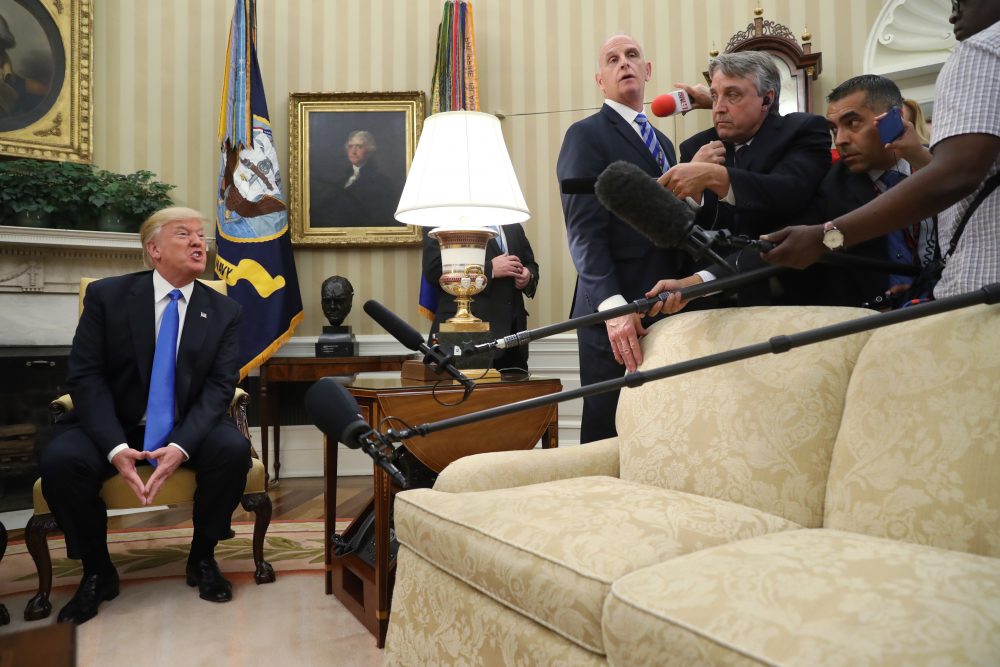Advertisement
President Trump's Tweets And 'The Bully Pulpit On Steroids'

This week on Freak Out And Carry On, Ron Suskind and Heather Cox Richardson speak with Nicco Mele, director of the Shorenstein Center on Media, Politics and Public Policy at Harvard University. They respond to President Trump's CNN and Mika Brzezinski tweets, discuss the media's role in the first 100 days of the Trump administration and look at historical parallels, from the John Peter Zenger trial to Richard Nixon.
Excerpts
Nicco Mele: So we've done five studies — all of 2015, 2016, and the first 100 days of Trump — looking at mainstream major media coverage of Trump. The truth is the media during the campaign overwhelmingly gave Trump positive coverage. However, one of the reasons for that is that a lot of the stories were driven by polling, and the story was always that Trump was rising in the polls. Despite all kinds of conventional wisdom to the contrary, he was winning!
In the first 100 days the coverage is overwhelmingly negative. However, most of the time in the first 100 days, the only person that the media quotes on Trump is Trump. I think it's 6 percent of the time they quote a Democrat, 4 percent of the time a congressional Republican, and almost no policy experts. The stories about Trump quote Trump.
And so it's a very weird dynamic: it's overwhelmingly negative, but it's also all Trump, all the time. Compared to the last three presidents, he dominates news coverage. So much more of the nightly newscast is about Trump, in the first 100 days, than any prior president. It's really astonishing — almost to the exclusion of all other news. I'm talking about sports news and weather news, like, he crushes it.
Ron Suskind: You mention sports news; I'll just mention this: Years ago, an ABC producer said, "Why do people watch sports on television?" I said, 'well, I don't know ... there are winners and losers' — but no, no, no, no. It's the only thing that occurs on television. It actually happens. Everything else is produced. Trump occurs on television. You can't take your eyes off of him.
He had the best lines! "Lyin' Ted," "Crooked Hillary," "Low Energy Jeb." I mean, you can't not credit a kind of twisted genius in managing that.
Heather Cox Richardson: The thing that keeps jumping out at me is that Ron keeps asking what's new, and we keep talking about the moment of what Trump's doing. How is the fact that this man happens to be using Twitter any different than the rise of radio, which people would have said the exact same thing about? Or the rise of popular newspapers in the late 19th century, which was so new that the established politicians ... missed it altogether? You know, after the the election of 1890, they sat in the White House going, "What happened? We didn't see this coming, how did we lose all these elections?" I mean you could go right back to the printing press for being brand new technology. How is what's happening at this moment any different than what happened throughout human history?
Suskind: Well, maybe part of the issue is a comparative one, in terms of the counterpoint to that. To me going straight to the American people on radio, let's say "fireside chats" with FDR, and the cosseting around it of news, lots of other news. Reported news. Maybe the deficit of that, the diminishing of that, makes what he's doing in this direct feed even more important, because it doesn't have competition.
Mele: I mean, yeah, I think what's different is that, in those other media, it was pretty expensive to have a radio broadcasting license, and it was pretty expensive, actually, to print newspapers. And that meant that very few people actually could do it. There was still political power in it, but part of what makes Trump work is the vast proliferation of media and noise. You know, if you take everything every human ever created in terms of information from the dawn of humanity — cave paintings — all the way to 2010, that's about how much we create every 36 hours today. Instagram, Facebook, everyone's participating in this giant cacophony, and it is beautiful and ugly and terrifying, but it also incentivizes a kind of behavior to break through.
Richardson: I'd like to point out that, in his memoirs, Nixon maintained until the end that Watergate was the fault of the media, that he had done nothing wrong, and that he was resigning not because of Watergate or the cover-up, but because the media was making it impossible for him to do his job. And that I suspect goes right to what's happening with President Trump's attacks on the media. People hate the media when it's pointing out the fact that they are in fact doing something they shouldn't be doing. They're either unpopular or they're doing something illegal. This is not new in American history.
Suskind: In the early days of the George W. Bush administration, I was covering them, and I sat with Karen Hughes, who was Bush's right-hand. We sat in her office, and I said "I want some access to George W. Bush." And she said, "OK. What kind of access?" And I said, “Well, an example I have that I think has been widely noted was during the Ford administration. They had a reporter for The New York Times, John Hersey, spend two weeks with Gerald Ford — fly-on-the-wall — and produce an extraordinary piece in The New York Times that really was a seminal piece on that presidency. I mean, I'd hope for something like that.” She's like "Uh-huh. Well let me give you a counterpoint." And she opened the drawer, and she pulled out a Time magazine. It was after the midterm elections, and they had a picture of George W. Bush on the cover. She's like, "This piece in Time? This cost me 17 minutes. And if it wasn't so lovely, next time they'd get seven minutes." She says, "Let me explain to you. We see the mainstream media like we see another partisan in Washington. Like the healthcare lobby. We no longer have any need to work through you. We now have our own press. Fox News, the conservative press — they're ready for us, and they're ready in ways we want them to be ready. So we can ignore you. At this point, you need to get used to not being needed anymore."
And to be fair, this was about power, not party. Many of those techniques were not only used but advanced by the Obama administration. [They said], "We are going to choke off access to informed reporters sitting with the president of the United States in on-the-record interviews.” And in fact, you can even look at George W. Bush and Barack Obama and say we had less access to Obama than we did to Bush.
Richardson: In 1733, a printer named John Peter Zenger started to publish material ... that was critical of one of the king's representatives, one of the king's royal governors in America. And it was illegal to criticize the king or his royal representative in the colonies. So he's arrested in 1733, and theoretically, he's supposed to stop publishing his newspaper. One night it doesn't get published, but the next day his wife takes it over and she continues to publish it while he is in prison. ... And the standard for whether or not he's guilty is whether or not he published this material. Now there was no doubt he'd published this material, but he gets an up-and-coming lawyer whose fairly well-known then, who goes in front of the jury and he says, "listen, I'm not going to argue that he published this material, because he did publish this material. But what I'm going to argue is that the truth matters. I want the king's representatives to have to argue that this is not true." And in fact, it is true. He goes before the jury, and he says, you know, you can find him guilty if he has in fact published material that is not true. But if in fact the king's representative is corrupt, and all the things he said are true, then you must find him not guilty. The jury goes out very briefly, and they come back with our first jury nullification, in which they say "yeah, he's not guilty." And that recognition that newspaper publishers have the right to criticize the government becomes such a part of American culture.
And when the Founders write the Constitution, I think it's really worth noting that the First Amendment to the Constitution — not the Third, or the Seventh, or the Tenth — is the right to a free press. And one of the Founding Fathers — a guy named Governor Morris, who was at the Constitutional Convention from Pennsylvania — actually looked back to John Peter Zenger's trial, and he said it was the Zenger trial that launched liberty in America, because Americans figured out that they could criticize authority and write a government that belonged to them and that was based on the Enlightenment principle of truth. I think Americans still believe that, and they want that back.
Suskind: Nicco, how concerned are you about press freedoms today?
Mele: I'm terrified. I'm just really concerned. Like how concerned am I? 11!
It's a trend that started in many ways in the Obama administration, and not just the Obama administration — the last, you know, 35, 40 years of American presidential activity. [It's been] consolidation of executive power over the last three decades combined with a growing suspicion of the media and also the sense that you could push back, that in the current economic and technological upheaval, the media was vulnerable. But I think that what concerns me most, or why I'm so concerned, is that I think it speaks to this crucial idea of the public. I'm just not sure that Americans have a shared sense of the public anymore. There was a study in May by the American Press Institute that talked about, you know, "Do you trust the media?" Everybody says no. But earlier in the survey they'd asked, "What media do you consume?" So maybe you say well, I watch Fox News or I read The New York Times. "Do you trust the media?" "No." "Do you trust the media you consume?" "Oh yes." And there's a similar kind of paradox in Congress. People hate Congress. They love their member of Congress. And I think that when I look at the landscape and the polarization in America today and the state of local and federal institutions, that what we've lost is some sense of the public. Of public good, of public service, of something shared there that just doesn't exist anymore. And if that goes away then accountability is a different question. Then the role of the media is just, "It's your media, not my media." That kind of sets in motion a whole bunch of other things that are really dangerous to the social contract.
The views and opinions expressed in this podcast are solely those of the participants and do not in any way reflect the views of WBUR management or its employees.
